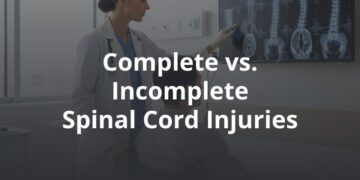Every personal injury case is unique. A case’s outcome will change based on the individual circumstances. One factor that can play an important role is the extent or severity of the victim’s injuries. Long-term, permanent or catastrophic injuries require additional attention, as they make personal injury cases more complicated. You may need to hire a personal injury attorney in Austin to help you recover fair financial compensation for a long-term injury.
What Is a Long-Term or Catastrophic Injury?
In personal injury law, the distinction between a standard injury and a catastrophic injury is important. A “catastrophic injury” will result in significant, long-term or permanent effects on a victim’s life. These effects may be physical, such as the loss of an important bodily function, or emotional. Psychiatric conditions, such as post-traumatic stress disorder, can be catastrophic injuries if they have a substantial or long-term impact on the victim.
Types of Long-Term Injuries
It is important to recognize a long-term injury to handle the claims process correctly and receive fair compensation for what may be a lifetime of expenses and other consequences.
Examples of long-term injuries in personal injury law include:
- Back injury
- Chronic pain
- Compound or multiple bone fractures
- Disk herniation
- Joint injury
- Loss of limb
- Loss of sight or hearing
- Nerve damage
- Organ damage
- Permanent paralysis
- Quadriplegia or tetraplegia
- Scarring or disfigurement
- Severe burn
- Skull fracture
- Spinal cord injury
- Traumatic brain injury
Long-term injuries can have debilitating symptoms that a victim may never completely recover from, including pain, discomfort, loss of mobility, sensory changes, physical disfigurement or disability.
What Makes Long-Term Injury Claims Unique?
Long-term injuries are treated differently in the context of personal injury law compared to minor injuries since they will affect the victim for a longer amount of time and often in a more significant way. A long-term injury or illness can permanently prevent an individual from enjoying daily life and favorite hobbies or activities, as well as working or earning a living wage.
If an injury will affect the accident victim for the rest of his or her life, an insurance company, judge or jury will take this into account when making decisions on the case. In general, the damages resulting from severe or long-term injuries are greater than those resulting from minor injuries. This means long-term injury victims require greater financial compensation for their harm.
How to Prove a Long-Term Injury
In personal injury law, the injured accident victim (known as the plaintiff) bears the burden of proof. This means the plaintiff must prove what he or she is claiming and meet the evidentiary standard in civil law, which is a “preponderance of the evidence,” or more likely to be true than not true. Proving a long-term injury takes collecting and presenting evidence.
Examples of evidence may include:
- Medical records, including X-rays and doctor’s notes
- Healthcare costs and bills
- Personal testimony from the victim or the victim’s friends and family
- Medical expert testimony
- Photographs and videos
A personal injury attorney can help you secure evidence, witnesses, and documentation to prove your long-term injury case. Your lawyer can demonstrate that your serious injury was the result of someone else’s negligence, or the failure to use ordinary care and establish the losses you suffered as a result. A law firm can prove your case through depositions, a medical examination, document production, and the hiring of highly qualified experts.
How Much Is a Long-Term Injury Case Worth?
The extent of the economic (tangible) and non-economic (intangible) harm resulting from a long-term injury means that catastrophic injury victims are generally eligible for greater financial compensation than those who suffer minor injuries. Lasting disability or disfigurement claims could be worth a significant amount in damages.
The types of compensation that may be available include:
- Past and present medical expenses
- Estimated or projected future healthcare needs
- Live-in or around-the-clock care
- Losses of income and employment benefits
- Lost future capacity to earn due to a long-term disability
- Property damage repairs or replacement
- Physical pain and suffering
- Emotional distress or mental anguish
- Loss of consortium
It is important to know the potential value of your claim so that you do not settle for less than you deserve during negotiations with an insurance company. Hiring an attorney can allow you to accurately evaluate the value of your case and pursue just results during an insurance claim or personal injury lawsuit.
Mistakes to Avoid During Your Long-Term Personal Injury Case
Correctly navigating a long-term personal injury case is critical to safeguard your financial future. Recovering the compensation you need for the various costs and losses you will endure can make it easier to move forward with your life.
To achieve the best possible results for a long-term injury case, avoid the following mistakes:
- Delaying medical care. Don’t wait to see a doctor after an accident. Begin treatments immediately, including therapy for psychiatric disorders, to establish your injuries.
- Underestimating your losses. You may not realize the extent of your injuries or the effects of an accident until your injury progresses and the symptoms become more apparent.
- Saying too much too soon. When speaking to an insurance claims adjuster, do not say you aren’t injured or your injuries are “not that bad” until you’ve seen a doctor.
- Trusting an insurance company. Do not give a recorded statement to an insurance adjuster or give away too much information about your injuries.
- Accepting the first settlement offer. Wait until you understand the extent of your injury and have an accurate prognosis and treatment plan before accepting an insurance claim settlement.
- Handling your injury claim alone. Long-term injuries can have significant effects on your life. You have too much at stake to risk not hiring a personal injury lawyer to represent you.
- Missing your statute of limitations. In Texas, state law places a general filing deadline of two years on personal injury claims. Waiting too long to seek justice could mean losing the right to file forever.
Hiring an experienced personal injury lawyer can enable you to protect your rights throughout a long-term or catastrophic injury claim in Texas. Your attorney will fight for the case results that you need while you focus on medical treatments and planning for the future.
Speak to a long-term injury lawyer in Austin, Texas today when you contact FVF Law. Contact us online or call (512) 982-9328 anytime for a free, no-obligation consultation. We have over 100 years of combined legal experience and will help you understand your legal rights and options during these tough times.







